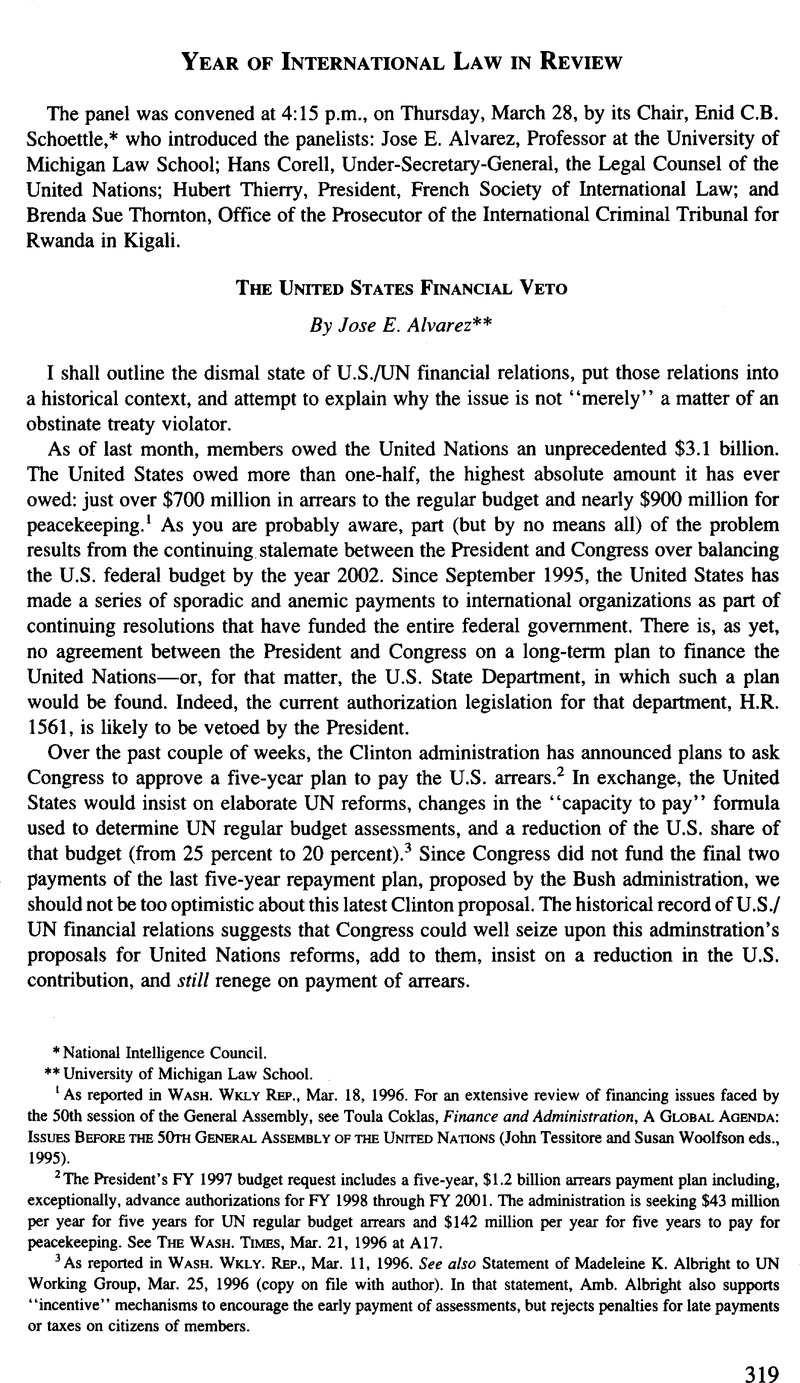No CrossRef data available.
Article contents
The Unite States Financial Veto
Published online by Cambridge University Press: 17 February 2017
Abstract

- Type
- Year of International Law in Review
- Information
- Copyright
- Copyright © American Society of International Law 2015
References
* National Intelligence Council.
1 As reported in WASH. WKLY REP., Mar. 18, 1996. For an extensive review of financing issues faced by the 50th session of the General Assembly, see Toula Coklas, Finance and Administration, A GLOBAL AGENDA: ISSUES BEFORE THE 50TH GENERAL ASSEMBLY OF THE UNITED NATIONS (John Tessitore and Susan Woolfson eds., 1995).
2 The President's FY 1997 budget request includes a five-year, $1.2 billion arrears payment plan including, exceptionally, advance authorizations for FY 1998 through FY 2001. The administration is seeking $43 million per year for five years for UN regular budget arrears and $142 million per year for five years to pay for peacekeeping. See THE WASH. TIMES, Mar. 21, 1996 at A17.
3 As reported in WASH. WKLY. REP., Mar. 11, 1996. See also Statement of Madeleine K. Albright to UN Working Group, Mar. 25, 1996 (copy on file with author). In that statement, Amb. Albright also supports “incentive” mechanisms to encourage the early payment of assessments, but rejects penalties for late payments or taxes on citizens of members.
4 As reported in WASH. WKLY REP., Jan. 26, 1996. However, this overstates the degree to which other members are emulating the United States. In most cases, other members’ arrears are limited to current year's assessments; that is, most other defaulting members are simply not paying by the Jan. 31st deadline but later in the year assessments are due. So far as the author is aware, few members have attempted to condition their assessed contributions to the United Nations as has the United States.
5 As reported in WASH. WKLY REP., Jan. 26, 1996.
6 As reported in WASH. WKLY REP., Feb. 9, 1996.
7 See, e.g., United States Delegate Position Paper: Principal Issues Before Committee 5 (Oct. 21, 1946) in 1 FOREIGN RELATIONS OF THE UNITED STATES 467 (1946).
8 See, e.g., GA RES. 44/195,44 UN GAOR SUPP. (No. 49) at 277, UN Doc. A/Res/44/195 (1989). See also, Certain Expenses of the United Nations (Article 17, paragraph 2), 1962 ICJ 151 (Advisory Opinion of July 20) (hereinafter “Certain Expenses”). For the immediate aftermath of that case, see 13 M. Whiteman, DIGEST OF INTERNATIONAL LAW 320–34 (1968).
9 For a survey of the 1980s withholdings and their consequences, see Jose E. Alvarez, Legal Remedies and the United Nations A La Carte Problem, 12 MICH. J. INT'L. LAW, 229 (1991).
10 Foreign Relations Authorization Act, FY 1994–5, sec. 401(b) (threatening a 10 percent withholding from the U.S. contribution toward the regular budget for FY 1994 and 20 percent for FY 1995). Soon thereafter, the General Assembly created an “Office of Internal Oversight Services.” See GA RES., A/Res/48/218, Aug. 14, 1994. Further U.S. payments to the United Nations are likely to remain contingent on Presidential certifications of that office's continued effectiveness.
11 Foreign Relations Authorized Act, FY 1994–5. Congress took this step without seeking agreement from the United Nations, and if one accepts the premises of the Certain Expenses case, in clear breach of a treaty obligation. As of mid-1996, the Clinton administration, bound by Congress’ 25 percent limit, was still trying to get the United Nations to accept the mandated reduction. From the perspective of the United Nations, the United States still owes 31.7 percent towards peacekeeping expenses for 1995 and 1996.
12 140, CONG. REC H2873 (daily ed. Apr. 28, 1994).
13 Many of these provisions were contained in versions of the National Security Revitalization Act (H.R. 7).
14 For example, under one proposal, payment of assessments to the World Bank would be conditioned on an Executive branch certification that the Bank had not approved any loans to Iran.
15 But some members of Congress seek U.S. withdrawal from the United Nations. See, e.g., the United States Withdrawal Act introduced by Rep. Joe Scarborough (R-FL), and twelve other sponsors (proposing to reduce all U.S. contributions to the United Nations by 25 percent each year for four years, leading to U.S. withdrawal).
16 See, e.g., Peter Raven-Hansen and William C. Banks, Pulling the Purse Strings of the Commander in Chief, 80 VKO. L. REV. 833 (1994).


